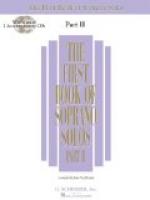Adele enjoyed her own satire, but Winifred was too repentant to laugh.
“Oh, Adele,” she said, “it is dreadful that there has been no ’joy in the Lord’ about it. At least, I never knew it in the choir. Christ was never the center of our thoughts” (she was thinking of Mr. Bond’s sermon), “the object of devotion. If we worshiped anybody or anything outside of ourselves it was Music.”
“Orpheus?” suggested Adele.
“Yes,” said Winifred, “we were pagans, I suppose. But oh, Adele, God is so good to forgive! It seems as though He were not looking at it at all—as if it had never been.”
Adele looked at her friend narrowly. “Winnie,” she said at length, solemnly, “I know what has happened. You are converted.”
Winifred opened her eyes in surprise. She had not thought to so define her new experience. Adele went on:
“We don’t talk much about it in our church, you know. But I used to go sometimes with old Auntie Bloom—she was so blind she couldn’t see the sidewalk—to a little Methodist church of some sort, Free, or Reformed, or something, and they made a great deal of that. Auntie Bloom used to get rather excited over it herself sometimes when she ‘testified.’ I used to duck my head when she waved her arms about. ‘A new creature!’ she used to shout. ‘There’s nothing like being a new creature!’” And Adele quoted the old lady with good-natured mimicry.
Winifred’s face glowed. “No,” she said, “there’s nothing like it!—if that is what has happened to me.”
Adele looked at the happy face covetously. “You look as though it were good, Winnie,” she said, and added meditatively: “I think it is all true about it. But you know, Winnie, when I was confirmed I really meant to be good. It was so solemn, and I thought I never should forget that dear old bishop’s hand on my head. But I haven’t turned out much of a saint, you know, dear.”
“I never thought you were wicked, Adele,” said Winifred.
“Well, I never robbed a bank,” said Adele, “but there’s no question about my being ‘this worldly’ enough.”
Winifred did not know just how to answer this. It seemed a charge that would cover both their previous lives. In a moment’s silence a sweet-toned clock on the mantel softly struck a half hour.
“Oh, I must be gone!” cried Miss Forrester, “and we haven’t talked about half—”
“Do stay to lunch,” interrupted Winifred.
“Impossible, dear. I am due at home—half an hour ago!” and she laughed at the discrepancy between her appointment and appearance. “Good-by, Winnie.” And she was off.
The two, very opposite in temperament, were very warm friends. Winifred saw beneath a light exterior a quantity of good, sound sense and a warm heart. She was a frequent guest at their house. Mrs. Gray liked her, though deploring her occasional indulgence in slang. Mr. Gray enjoyed her racy conversation, and Hubert professed a dislike of her volatile qualities. This last fact grieved Winifred, who liked her friend to be appreciated.




